Circle 5: Ecology of Transformative Learning Practices With/In A More-than-human World
In this study circle, we nurture a diversity of practices for mutual learning and knowledge creation through conversation and play with the “more than human”. We build a community of practice, where we create ‘playgrounds’, ‘ephemeral ponds’ or spaces of not knowing, which are focused around prompts and themes for especially young scholars to experience and test methods, and examine afterwards through their own frameworks/theories. These spaces aim to instil opportunities to grow epistemological humility and inner pathways toward responsibility.
Next events:
Learn more about the next symposia and find the calls for papers, poems and practices for each symposium.
Summer Session
Webbing, Winging and Weaving Economies
for Rewilding Academic and Organisational places
21–28 July, 2025, Jyväskylä, Finland
Life is made in relationshipping.
Communicating in shared nutrients, as trees
do, in the beautiful way to think of how our
communion might also be.
Life is
an enormous conversation.
- Nora Bateson, Combining

In this circle during the summer session we will explore what life forces are guiding our learning practices with more-than-humans, especially focusing on processes of giving and receiving in connection to our relationships with gifts of time, energy, money and power.
How do we perceive terms of webbing, winging and weaving economies within more-than-human learning processes from our personal stories starting with “gaining our daily bread”. How other living organisms are invited or not invited to express their voices in on-going everyday conversations in our life paths, choices and experiences?
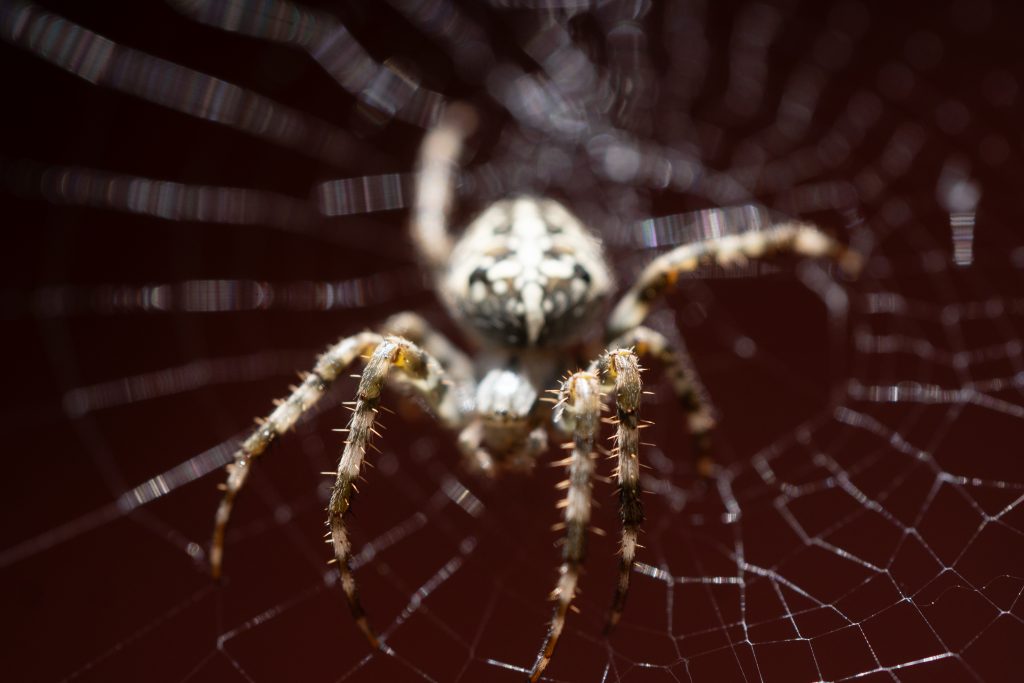
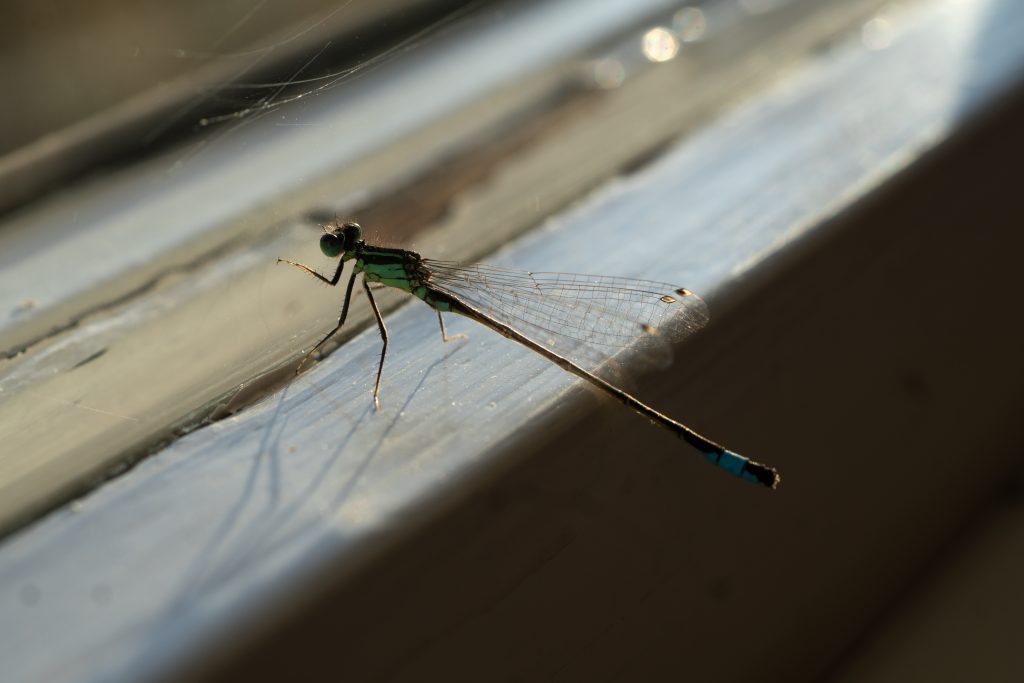
We will begin to look closer into flows of finance, investment and philanthropy to anticipate soils of rebirth. We will share observations of the landscapes of funding in a trans-gen(d)erational workshop with the aim of syncopating (sense of surprise and humour, Bayo Akomolafe) the existing rhythms of funding in academia and life generating impact investing towards possibilities of blended, slow finance, slowed-down inquiry that make space for “unusual business”.
Theme questions: What is money, finances, economies? How do they manifest in direct and indirect ways in our daily practices, starting with the familiar efforts made in reaching our daily food? What are diverse drivers within more-than-human transformative learning? What stories does finance tell and shape? In which stories do we participate and what stories do we create by applying or benefiting from certain fundings/supports/institutions? How are those funders/supporters/institutions being transformed or not by our more-than-human participation, exchanges and relationships? What are ways of resourcing each other? Where is potential for trans-gen(d)erational, trans-cultural, trans-species relationship creation? How funding is shaping/guiding or not our practices? What can we learn from communing with plants, fungi and inclusive finance systems? How more-than-human practices inside and outside academia are being weaved or not through financial and technological forces? What economies (poetic, market, family, community, caring, mothering, sharing, gift or some other) are shaping what financial flows? How might pleasure, joy and satisfaction play into transformative learning with more-than-humans shaping inclusive shared futures by honouring time, energy, value, mattering (Pershouse 2020)?
Call for participation: Please send us proposals for sharing your practices, short papers, poetry, story, art works reflecting on:
- Interactions between our practices, funders/supporters/institutions and multiple participating species;
- Observations how funding/support sources shape our creative practices;
- Observations and experimentations nourished by different economies, relationships and ecologies;
- Finance as our practice driver or inhibitor or factor having no influence on our creative work;
- Participation and inclusion of plants, fungi and other humans and non- humans in finance schemes.
Deadline for your contributions: 1st May 2025, vitalija.ppetri@gmail.com and heidenjoy@gmail.com
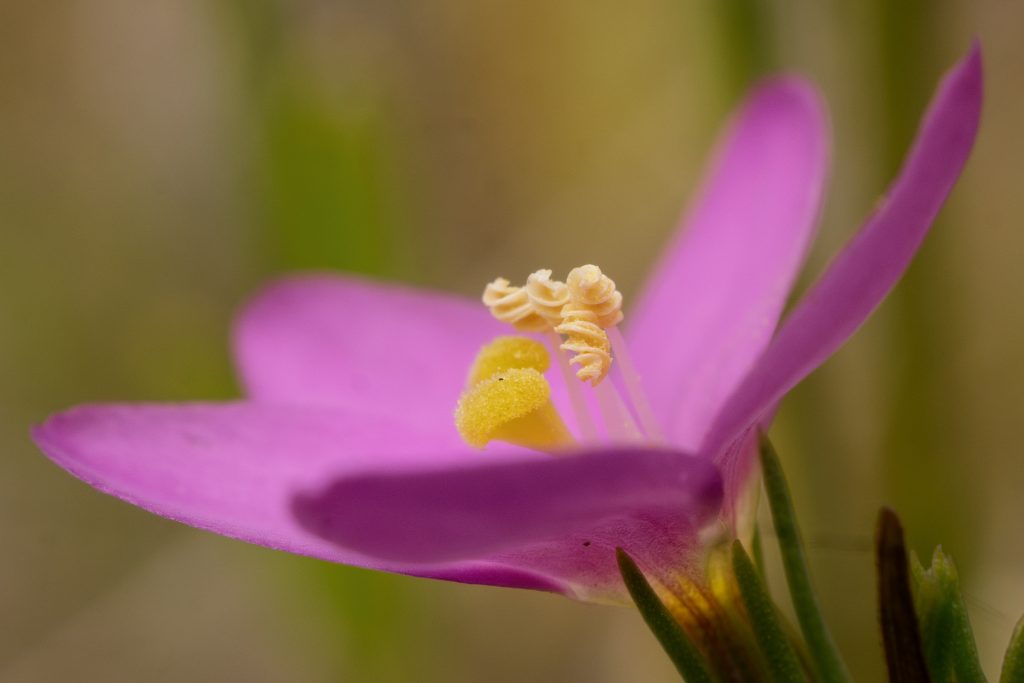
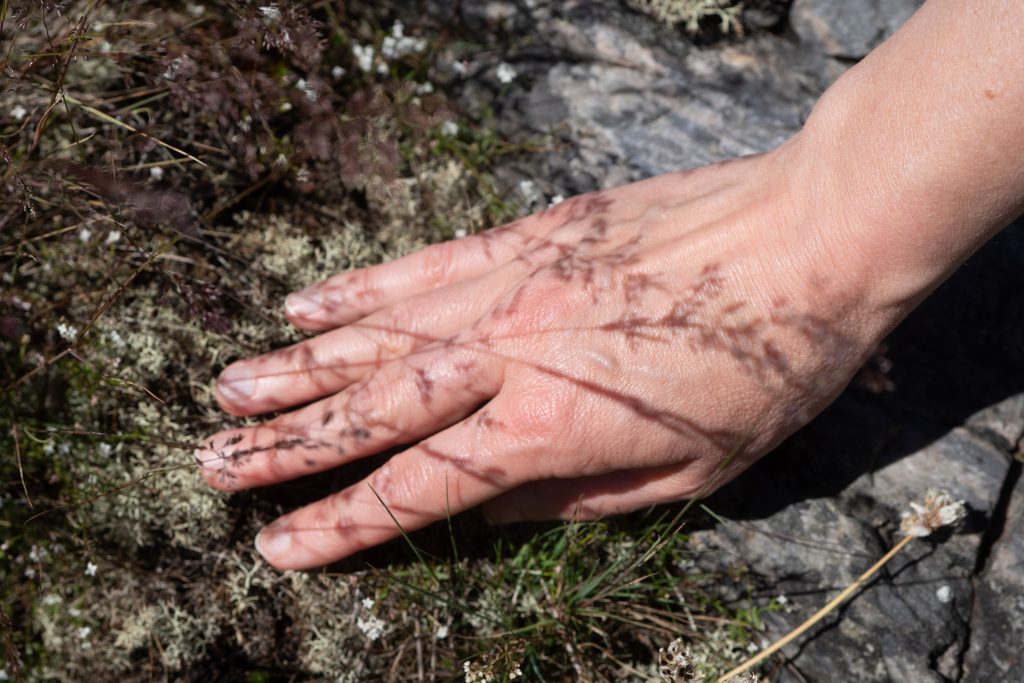
Payment: The price range for the full week including lodging, meals, membership and the program. If you are a member of NSU already, you will get a discounted price, contact arrangement committee (arrkom@nsuweb.org) for more details.
- 650 EUR — volunteers (single bed in a twin room shared with another volunteer/participant)
- 450 EUR — scholarship receivers (stay in 4–5 people apartments)
- 850 EUR — single room
- 700 EUR — bed in a twin room
- 650 EUR — family room [per person]
- 1250 EUR — institutional price. Institutional price is intended for participants whose attendance is paid for by their institutions, e.g. trough research grants or similar dedicated funding
- 950 EUR — institutional price PhD
- 440 EUR — shared lodging (indoor camp rooms (shared accommodation))
- 400 EUR — camping
▶️ References (click to open)
Arlander, Annette. 2025. “Pondering With Örö Pines: Talking With Trees As an Undisciplinary Method”. Plant Perspectives, January. https://doi.org/10.3197/
Bayo Akomolafe | Becoming-black: On White Syncopation at the End of the World, https://www.youtube.com/watch?v=dca_1WDxVoY
Nora Bateson, 2023. Combining, Triarchy Press.
Tim Ingold on the Future of Academic Publishing, https://allegralaboratory.net/interview-tim-ingold-on-the-future-of-academic-publishing/
Tim Ingold, 2023. The Rise and Fall of Generation Now, Polity Press.
Monica Gagliano, Ecological Reparation: Resonant Earth, https://www.youtube.com/watch?v=t66Z5nKvIjU
Jenny Grettve, 2024. Mothering economy, Jenny Grettve Studio.
Robin Wall Kimmerer, John Burgoyne, 2024. The Serviceberry: Abundance and Reciprocity in the Natural World, Scribner.
Lawrence, A. M., 2022. Listening to plants: Conversations between critical plant studies and vegetal geography. Progress in Human Geography, 46(2), 629-651. https://journals.sagepub.com/doi/10.1177/03091325211062167
Dimitris Papadopoulos, Maria Puig de la Bellacasa, and Natasha Myers, eds. (2022) Reactivating Elements: Chemistry, Ecology, Practice, Duke University Press.
Pershouse, D. (2020). Other Species are Essential Workers, Whose Economies Enfold Our Own: Is human society collapsing because we don’t recognize the work and intelligence of other species? Published in: The Regenerative Economy Collaborative.
Timothy Morton, 2024. Hell: In Search of a Christian Ecology, Columbia University Press.
Dirk De Wachter, Never satisfied? This is why https://www.youtube.com/watch?v=wXkn70c-5G4
On-line session Writing(with)Plants
Writing(with)Spruce trees on 29 January 2025 at 19.00-21.00 CET
Register here
More on Writing(with)Plants practice by Wendy Woods here
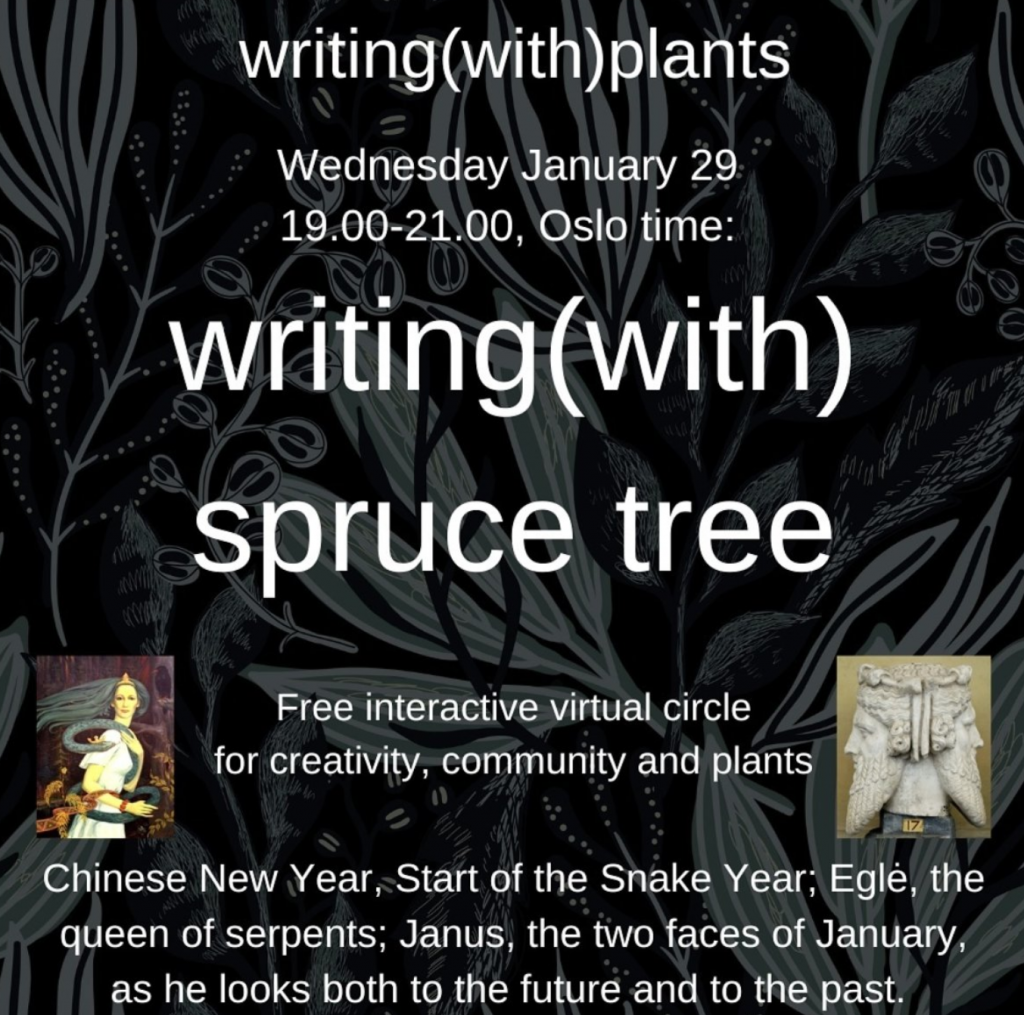
On-line Warm Data Lab “People Need People”
30 January 2025 at 15.00-17.00 CET
offered within the program of the international conference “Care, Aesthetics, and Repair” hosted by University of Humanistic Studies, Utrecht, the Netherlands
Register here
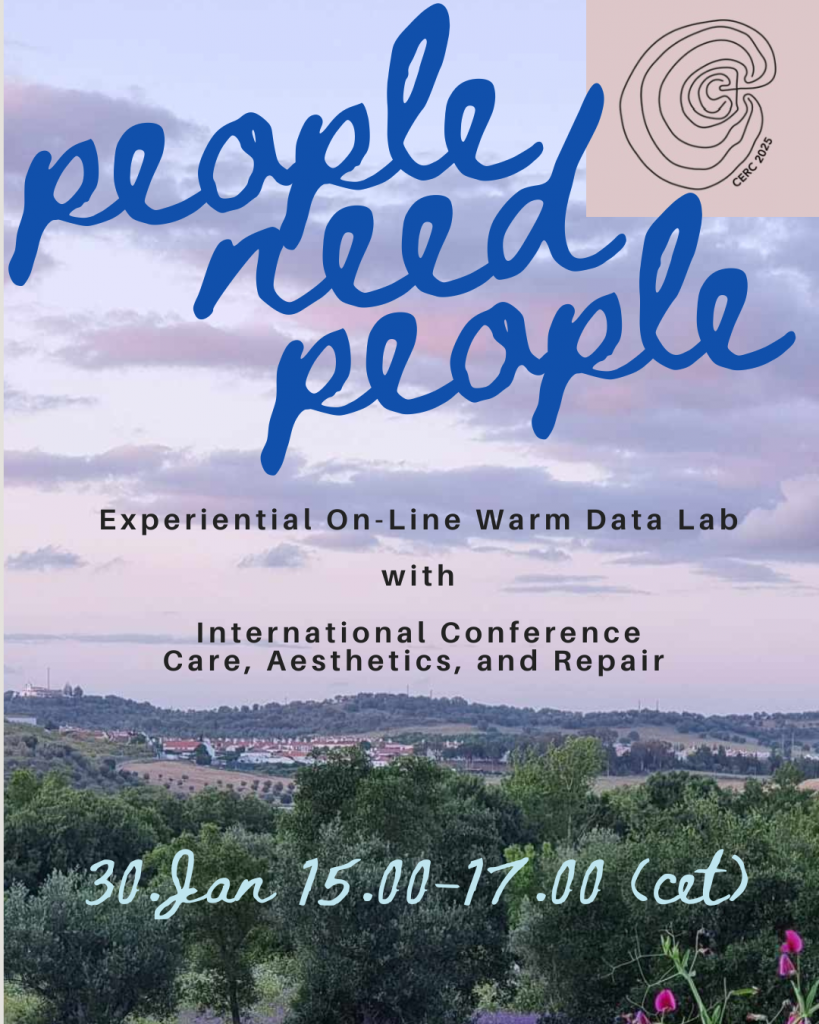
Winter Session “Re-rooting and restor(y)ing academic spaces”
21-22 March, 2025. Denmark: Isle of Fyn
From mud to meal, we practise novel ways of tasting food and becoming. We explore dampness of old cellars, cook root vegetables, taste bitterness, and sweetness, make food like 500 year-old ancestors.
Activities: One outdoor activity of 2-4 hours, e.g. a sensing walk from indigenous to modern (academia); sharing and giving feedback on talks, texts, films, images and stories; one writing(with) plant session of 2 hours.
About the location: The location is a small farm on Isle of Fyn, 40 min by car from Odense, Denmark.
Topics of our explorations:
- Re-rooting and restor(y)ing academic spaces;
- Re-rooting with the more-than-human-world through mud, mold, food…;
- Reviving traditional farming techniques and wisdom;
- Bioregional educational futures;
- Post- and ecohumanist education;
- Ecofeminist perspectives on academic spaces;
- Queer ecology and academic spaces;
- Educating(with)plants.
(This list is non-exhaustive. We are open for proposals of papers, poems, storytelling sessions, an outdoor practices… as long engagement with the more-than-human-world is in the core of the proposal.)
Submissions closed.



About Study Circle 5: Ecology of Transformative Learning Practices With/In A More-than-human World
“What if, instead of thinking of a theory of change being produced from an identified preferred goal or outcome, the focus instead was placed on the way in which a system becomes ready for undetermined change? Can unforeseen ready-ness be nourished? While linear managing or controlling of the direction of change may appear desirable, tending to how the system becomes ready allows for pathways of possibility previously unimagined.” – Nora Bateson (An essay on ready-ing: Tending the prelude to change)
“We have dreamed together about unpredictable directions, about midwifing new perceptions, about autistic cartographies that stray from the tried and tested. Taking seriously the insurgent premise that thought isn’t exclusively human, that the world is alive, and that the way we approach the crisis is speculatively part of the crisis, we have wondered what it might look like to truly ‘stay with the trouble’. “ – Báyò Akómoláfé



Aims and goals of the project:
This project addresses the crisis of separation and alienation between humans and the more than human world. This led to other crises, such as climate crisis, polarisation etc. Especially in posthumanist sustainability science, socio technological (ST) studies and gender studies, this crisis of separation has been studied for decades. To counter this, scholars have raised questions on practices of knowledge creation and learning, and experimented with various radical landscape engagement methods to foster transformative learning and care. Presencing our felt sense in relation to the more-than-human expands our window of perception, affecting knowledge management. This can open the academic fields to new ways of communication when engaging with the dominant discourse and changes who we can be in organisations (Wilmott 1993). This project proposes attention to process and a new ecology of communication in academic spaces.
However, academic spaces are part of a patriarchal system that reinforce the barriers that hinder these radical practices and curtail the potential of transformation. Knowledge is rooted in contexts, micro-particularities and specificities. Science constitutes but a layer of “expertise” yet it has acquired a monopoly of truth and power in the decision making processes of society. Replicating colonial patriarchal dogmatism and slow violence, science needs an update.
To address these patriarchal structures, this project weaves theories of different fields and knowledge systems, inspired by various scholars:
- eco-feminists (Plumwood, Shiva, Haraway, Braidotti, Barad, Federici, Irigaray)
- biosemioticians (Hendlin, Affifi)
- plant thinkers (Gagliano, Marder, Aloi, Mancuso, Manning)
- indigenous scholarship (Goodchild, Wall Kimmerer, Yunkaporta, Akomolafe).
They have paved the way for academia to become a place of encounter to explore identities of scholars as porous unfinished beings that are in continuous transformation.
In this study circle, we nurture a diversity of practices for mutual learning and knowledge creation through play with the “more than human”. We build a community of practice, where we create ‘playgrounds’ or spaces of not knowing, which are focused around prompts and themes for especially young scholars to experience and test methods, and examine afterwards through their own frameworks/theories. These spaces aim to instil opportunities to grow epistemological humility and inner pathways toward responsibility.
We see these academic spaces as “ephemeral ponds” of inquiry: how do we reshape learning organisations into a place that leaves space for life to evolve beyond the industrial techno-solutionary and media-marketable sci-craze gaze? What is sanctuary in academia? To whose needs are schools and institutions academia responding and how? What are the edges of organizations, where do they get stuck? Is academia a place for learning and expanding collective knowledge? What would it look like if academia were a place of composting scientific hubris and a place of mental health care? Can academia model eldership? What is the future of learning?
What if academia can be a place that expands – by bringing together the siloed fragments of scientific expertise into a space that is gesturing toward humility in light of the Not Knowing?
This study circle project invites academics and practitioners to meet on land and online. Each symposium will introduce current (re)search practices, such as forest bathing (Wuyts 2024), warm data labs, writing with plants. These practices are embedded in rigorous academic theories (Bateson, 2023; Akomolafe, 2023; Morton, 2024; Manning, 2022; Roy, 2018; Sehgal, 2024). Through connecting transdisciplinary academic approaches with the deeply personal, ancestral/historic, place- and context-based embodied experiences, we deliberately invite other species to our own human cultural contexts.
Shared vision for 2027
By the end of the circle, we, as a diverse team of learners, have united in our conspiring so that we begin to see the more-than-human and bio-neuro-cultural diversity in general as our greatest allies, both in nourishing all forms of life, cooling the planet, regulating our nervous systems, and bridging between cosmologies.
Contact us to ‘learn more with/in the more than human world’.
Sign up to our internal newsletter:
To follow the circle and/or updates about the symposia, please sign up to our mail list, especially for NSU circle 5. Every month, we sent a short update. You can sign up for our mailing list by clicking here or scan this QR code:

